Search
Showing 10 of 2157 results for read 2024 FRM Exam Part I - Quantitative Analysis online free
-
Around the world in five
CHINA
International students from China need extra support, say experts
US student agency WholeRen says Chinese students need extra support to succeed at universities, due to ‘only-child’ syndrome – Chinese students are typically a single child and come from a different education system, language and culture.
INDIA
Demand for education technology in India is huge – the challenge is language
There has recently been a sharp rise in India in the use of technology in education. Nick Cain, Project Manager (Education) at Google.org, talks about technology’s potential in providing quality education.
JAPAN
Most international students opt to stay in Japan after graduation
A survey conducted by the Japan Student Services Organization found that nearly three-quarters of international students in Japan at universities and other educational institutions remained in Japan to pursue employment or a higher degree.
MALAYSIA
Malaysia’s education is outdated says new education minister Mahathir
Malaysia’s new Prime Minister says the country’s teaching is “outdated” and wants to introduce online teaching so that Malaysians will be more computer-savvy.
UK
Slow uptake in study abroad, but student profile increasingly diverse
In 2017, UUKi launched a campaign to double the number of outbound international students by 2020. While the number in the latest report was near identical to the previous cohort, the findings revealed a more diverse range of undergraduates are choosing to study abroad.
-
Around the world in five
CANADA
Faster student visa processing for four Asian countries
Canada has launched a Student Direct Stream to make visa processing times faster for eligible students from China, India, Vietnam and the Philippines.
GLOBAL
Let them talk: The power of student reviews
Candid student reviews of study destinations and institutions have a profound impact on prospect engagement, search optimisation, and the overall effectiveness of the recruitment marketing effort.
US
Soft power declines as number of international students shrinks
The decline in international students studying in the US may mean a decline in the US’s soft power, according to two researchers at the University of Pittsburgh.
SOUTH EAST ASIA
Ed-tech start-up raises $8.5 million from Malaysian investors
An education technology start-up has raised $8.5 million as it aims to keep building its platform for hosting massive open online courses. The business has seven Australian universities and 30 Malaysian universities as customers.
UK
UK relaxes visa rules for students from 11 ‘low-risk’ countries
The UK Home Office has announced a revised immigration policy, no longer requiring student applicants from 11 countries to show proof for educational, financial and English requirements. The revised list does not include India, which The National Indian Students and Alumni Union UK has called unfair.
-
Around the world in five
JAPAN
Japanese-language schools expand offerings overseas
Japanese education companies are expanding their language offerings overseas to meet the growing demand for Japanese-speaking foreign manpower as the nation opens its doors to workers from overseas.
THAILAND
Thailand eyes lifelong learning push
To address concerns that Thailand’s “outdated” education system can no longer offer "future-proof" degrees for students, there are calls to develop a lifelong learning approach comprised of online learning, in-line learning, beeline learning and frontline learning.
US
US Department of State endorses education agencies
In a historic move, the US Department of State has officially endorsed the usage of education agents, with a State Department representative expressing a desire to “work together to promote the United States as the destination choice for international students.”
INDIA
India needs better strategies to promote 'Study in India'
Earlier this year, the Indian Government launched a ‘Study in India’ website to help foreign students find Indian universities, but more needs to be done. There were only 46,144 foreign students in India in 2017, but higher numbers could significantly boost India’s soft power and university rankings.
FRANCE
French university fees for non-EU students set to rocket
University fees for students outside of the EU, which will include Brits after Brexit, are set to shoot up by as much as 16 times the current cost, the French prime minister has announced.
-
Government delegation from South Korea visits New Zealand to reconnect with several of our education providers
New Zealand and South Korea have strong education links and one unique partnership is the education cooperation under the Korea-New Zealand Free Trade Agreement (KNZFTA) which has historically included education programmes for Korean school and tertiary students.
The visiting delegation included representatives from the Korea Ministry of Food, Agriculture and Rural Affairs (MAFRA), the Korea Ministry of Oceans and Fisheries (MOF), the Korea Agency of Education, Promotion and Information Service in Food, Agriculture, Forestry and Fisheries (EPIS) and Korea Fisheries Resources Agency (FIRA), the implementing agency for the MOF-funded project.
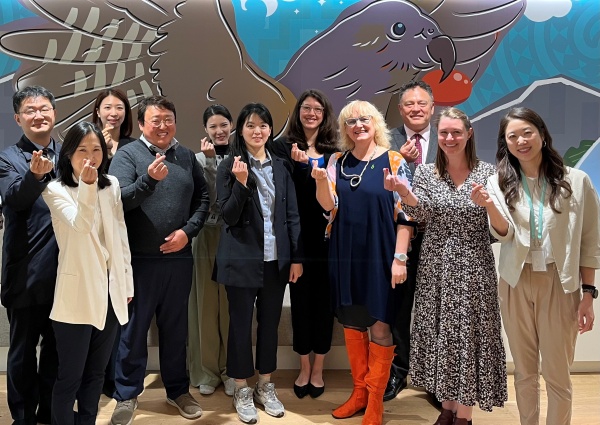
The delegation was welcomed to the ENZ Wellington office with a mihi whakatau on their first day. ENZ, Ministry of Education (MoE) and Ministry of Foreign Affairs and Trade (MFAT) colleagues joined together for waiata and kai with our Korean guests.
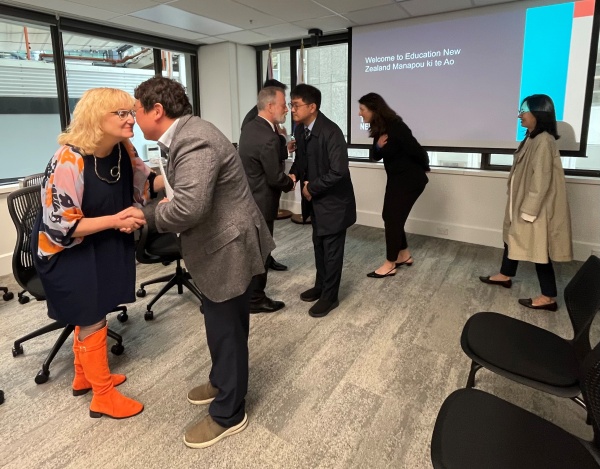
Following a welcome and mihi whakatau in Wellington, the group travelled on to Nelson where they visited Te Pūkenga Nelson Marlborough Institute of Technology (NMIT) and Nayland College. The visit to Nayland College was an opportunity for the Korean representatives to gain a better understanding of the pastoral care for school students and the unique offerings such as outdoor education and horticulture programmes.
Kay Lee, ENZ Senior Market Development Manager – Korea, said it was important for the Korean delegation to experience firsthand the welcoming and safe environment of New Zealand schools to regain confidence in the Schools Visits Programme.
“After the COVID-19 pandemic, the Korean Government was concerned about sending students, especially younger students, overseas to study particularly on scholarship programmes because parents wanted assurance their children will be well looked after. In the debrief with the Korean representatives, it was clear they gained confidence from speaking to the New Zealand institution representatives around the procedures and systems in place to support students.”
“We hope that this renewed confidence will mean that we start seeing Korean government scholarship school students studying in New Zealand again in the near future”.
High on the agenda during the delegation’s visit were the School Visits and Tertiary Training Programmes, both of which were affected significantly during the pandemic.
From 2016 –2019, the School Visits Programme provided 150 high school scholarships per year for South Korean students from rural areas to attend New Zealand schools for eight weeks. The Korean Government planned to continue the Schools Visits Programme with its own funding in 2020, however, the programme was cancelled due to travel restrictions during the pandemic.
An alternative programme was run by MAFRA and MOF from December 2022 which involved short-term English Language Training for school students in Korea with three New Zealand teachers travelling to Korea to teach English (Read about their experience here).The Korean organisers have decided to run the English language programme in Korea again with six New Zealand teachers traveling to Korea to teach English in January 2024.
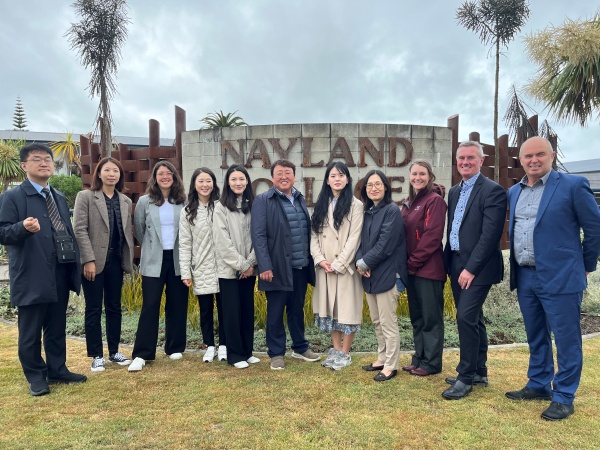
Nayland College demonstrated manaakitanga by welcoming the group to rainy Nelson but provided an Asia Kiwi lunch complete with meat pies and sushi!
Like the Schools Visits Programme, the pandemic interrupted tertiary programmes and the revised programme ran in January 2023 with short term group programmes. The site visits in November to Te Pūkenga NMIT and Lincoln University provided an opportunity to discuss the institutions’ proposals to host Korean tertiary students in January 2024.
Also discussed was the importance of reciprocity and it was noted that Korea is a popular destination for New Zealanders under the Prime Minister’s Scholarship for Asia (PMSA) scheme. Since 2016, the scheme has awarded scholarships to 196 individuals or groups for study, intern or research programmes in Korea. Lincoln University, in particular, has been successful in facilitating group PMSA programmes focused on agriculture to Korea.
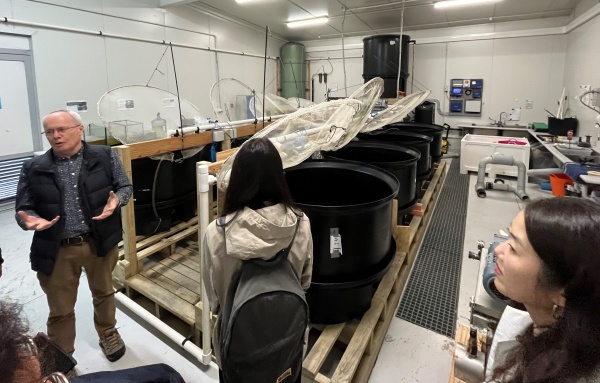
Dr Mark Burdass, Aquaculture Programme Coordinator and Tutor, introduces the hands on learning in the aquaculture programme at Te Pūkenga NMIT.
At the conclusion of their visit, the Korean delegation expressed their gratitude to the institution hosts for making their time in New Zealand memorable and valuable through fruitful discussions. The delegation emphasised the importance of conducting these meetings in person and visiting the campuses to meet with institution staff and academics. The ENZ Manapou ki te Ao team is pleased to continue close cooperation with our Korean education partners to facilitate connections with New Zealand education providers for the education programmes.
If you are interested in finding out more about the education initiatives originally outlined in the KNZFTA, you can read about this in a 2016 E-News article here - New opportunities for New Zealand and Korea.
-
Around the world in five
UK
Students reveal intent to build community links
A student roundtable session saw 20 international students from across the UK give feedback on their experience. More targeted orientation and help finding part-time work were among their top recommendations. The ability to work part-time was seen as very important, not only for financial reasons but because of the opportunity to access a wider network, build self-confidence, and to immerse themselves in city life.
INDONESIA
Researchers still not getting published
The head of Gadjah Mada University's (UGM) Graduate School of Medicine says inadequate writing skills means Indonesian researchers struggle to produce scientific papers for international journals. A recent study shows over a defined period, Indonesia published only 39,719 scientific documents, compared to Singapore’s 215,553 publications and Malaysia’s 181,251 publications.
UNITED STATES
Are micro-campuses a new model for international HE?
With an estimated 400 million people in developing countries lacking access to higher education, the University of Arizona (UA) has developed a ‘micro-campus’, using technology to deliver education to students anywhere in the world. Students watch lectures outside of class, and use class time on a local campus to work practically with other students.
SOUTH EAST ASIA
The demand for international schools in Asia continues
Recent data shows that the demand for international schools in South East Asia is exceeding supply. Furthermore, student enrolment is no longer dominated by expatriates, but by local families who want an English-medium education with globally recognised qualifications for their children. Across the region, the number of students attending international schools increased by 10 percent from September 2015 to September 2016.
EUROPE
Europeans back funding vocational training over higher education
A recent survey of nearly 9,000 citizens in eight European countries reveals that, when forced to prioritise one area of education, 17 per cent chose higher education, compared with 30 per cent who want more vocational education and training (VET). Support for higher education was highest in Spain (30 per cent) and Italy (23 per cent), and lowest in Sweden (6 per cent), Germany and Denmark (both 9 per cent).
-
Celebrating Dame Wendy Pye, a global education publishing success story
New Zealand has a proud history of educational publishing success and Dame Wendy Pye DNZM MBE is the epitome of this, being one of New Zealand’s leading educational publishing exporters. Dame Wendy is sharing her story in her recently launched autobiography: Teaching the World to Read: My multi-million dollar story and podcast series.
From humble beginnings growing up in Western Australia, Dame Wendy moved to New Zealand to work as a journalist before embarking on her dream to teach the world to read. She founded Sunshine Books 40 years ago and has since sold 300 million books, positively influencing the lives of many children worldwide.
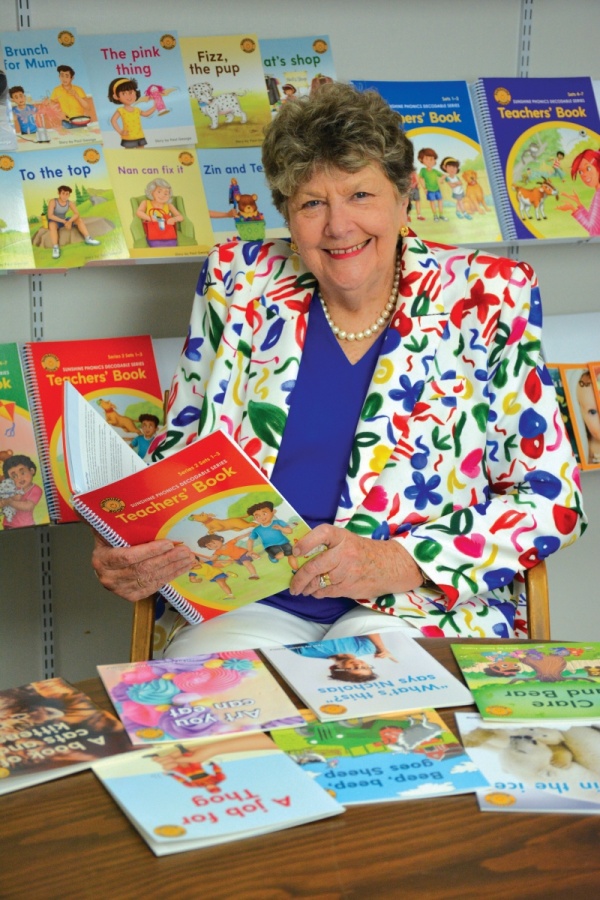
Dame Wendy with just some of the hundreds of Sunshine books that have helped young children learn to read.
During her extraordinary journey Dame Wendy has gone from attending book fairs with just a handful of books, through providing resources to refugee camps in Lebanon, to working with world leaders. Her reputation for helping to develop young children’s literacy skills has earned her numerous awards including being awarded the Dame Companion of the New Zealand Order of Merit in 2013 for services to business and education.

Dame Wendy at the Bologna book fair in 1989.
Throughout her publishing career, Dame Wendy has pioneered the development of new, exciting, engaging print and digital literacy materials. The Sunshine Online digital programme, for example, contains thousands of texts and activities and was recently included in the New South Wales Department of Education Online Learning Tools Marketplace, which provides quality online learning to all New South Wales schools.

Dame Wendy with school children using the Sunshine Online digital programme
Dame Wendy’s export story is as much about selling New Zealand as a leader in education teaching and learning pedagogy, as it is about selling educational products and services. Her book and podcast series offer an honest and candid account of the highs, lows, and tough truths of a pioneering entrepreneur. In her book, Dame Wendy talks about some of the challenges she faced, what she learned and how she overcame barriers, while the podcasts include export market guides including hints and tips for success that she has learnt along the way when working in the United Kingdom, South Africa, China and Australia.
 Dame Wendy hopes that her autobiography will inspire, educate and entertain.
Dame Wendy hopes that her autobiography will inspire, educate and entertain.
“This is a story about what is possible. It is a story that I hope will inspire all young people who are planning to make a difference to follow their dreams, not to be afraid of failures along the way, and also to celebrate successes with the people who have made them possible,” said Dame Wendy.
With New Zealand publishers and educators in such demand, our small country has made a large impact in the world of education publishing in more than 60 countries around the world.
This thriving industry is represented by PANZ, Publishers Association of New Zealand Te Rau o Tākupu, and is showcased on the New Education Publishers website that was sponsored by Education New Zealand Manapou ki te Ao and Copyright Licensing New Zealand.You can learn more about New Zealand Publishers or get in touch with them via the New Zealand Educational Publishers (nzeducationalpublishers.org) website.
-
Great ideas from schools
The ENZ Schools’ Reference Group was set up last year as a way to collect school feedback and ideas about how the sector can best develop.
ENZ Business Development Manager Mary Camp says the latest meeting on 25 February generated a swag of suggestions for the professional development workshops held in the lead-up to the New Zealand International Education Conference (NZIEC). More are welcome…
“This reference group is really benefitting our work to support the industry,” Mary says.
“Given there are so many schools, spread from one end of the country to the other, and with so much variety of character and programme, it can be hard for us to be sure we’re hearing what we need to hear from schools.”
“It’s great now to have an official channel open for that conversation, as well as the other connections we have through regional clusters and the like. We’ve been able to design services and products to suit schools’ current needs, and schools’ feedback on other parts of Education New Zealand’s work has been hugely valuable.”
Mary says the pre-conference workshops in 2013 (on business planning, social media and working with agents) were well attended and rated highly by participants. The aim is to keep relevance high for this year’s NZIEC – held in Wellington on 21-22 August 2014.
Additions to this ‘working topic list’ from the Schools’ Reference Group meeting are welcome:
-
Collaboration – looking at different collaborative business models, eg regional, niche
-
Homestay systems/ processes, building your homestay community, sharing ideas
-
Alumni – using them effectively
-
Agent perspectives – what are they looking for? (panel)
-
Market analysis – including hard stats, competitor analysis, and recommended key markets for schools.
To make a suggestion for workshop topics please contact one of ENZ’s Business Development Managers for the school sector, Richard.Kyle@enz.govt.nz or Mary.Camp@enz.govt.nz. -
-
Visa options checker live
The options checker provides better information specific to student circumstances on the range of visas that applicants may be eligible for.
The new Visa Options Check is easy to use. Users start by choosing one of four simple options: Visit, Study, Work or Live. From there, the navigation is straightforward.The new options checker is the first, small step in the rollout of Immigration New Zealand’s new technology platform, Immigration ONLINE.
When fully implemented by the end of 2015, Immigration ONLINE will allow all visa applicants to apply online. Information entered into Visa Options Check will be used to pre-populate part of a customer’s application form. Many will be able to complete the entire process online, through to final decision and receiving their visa.
Visa applicants, or advisers acting for them, will be able to complete and upload forms, supporting documents and photos, pay fees and ask questions online.
Online visa applications will start later this year with students and some temporary workers. By mid-2014, full online student visa processing will be possible through to final decision, and advisers will be able to view appropriate details of their clients’ applications online. -
Massey University promotes ‘borderless' online education
At the launch, Massey Assistant Vice-Chancellor Operations, International and University Registrar, Stuart Morriss spoke of the growing demand for online education and how Massey is well-placed to take advantage of this.
“Many universities provide online programmes to international students, but with Massey’s long history of distance and online learning, we have a strong competitive advantage.”
Massey University’s online education currently offers 45 degrees with 115 programmes. With no contact course requirements, students can complete these studies from anywhere in the world.
Massey University Worldwide General Manager Rob Stevens said this is a solid foundation, but there is room to grow.
“We already have a sizable offshore student body – some 9,000 overseas-based students use our distance programmes, and this number has been reached only through word of mouth! We now want to step things up a notch using a range of offshore promotions,” Stevens said.
Over the last few months, Massey has undertaken some preliminary online digital promotions as part of a ‘soft-launch’. In key markets, Massey’s website traffic has increased such as Malaysia (up 184%) and Singapore (up 70%).
ENZ’s Marketing and Strategic Relations Manager – Malaysia, Jane Goh attended the Singapore launch, and said Massey’s announcement reflects a wider shift in international education to go online.
“Not all international students are able to go abroad, for a variety of circumstances. Because of this, education providers are starting to ensure that students can study online, allowing them to enjoy the high-quality New Zealand education experience from anywhere in the world,” Goh said.

Attendees at the Massey University launch at the New Zealand High Commissioner's residence in Singapore
-
Around the world in five
CHINA
Why international scholarship programmes are flocking to Asia
In this new era of globalisation, China seems poised to assume a greater leadership role in world affairs. Many fellowship foundations, university leaders and students have recognised this shift and, as a result, international student numbers in China have skyrocketed from 100,000 in 2004 to 400,000 in 2015. It is important that universities support any students keen to study in China by encouraging them to apply their interests during their undergraduate years – including acquiring language skills.
CANADA
Canadian college builds app to help international students settle in
Nova Scotia Community College (NSCC) is building an app to guide its first-time international students to Canada with practical living information from housing to clothes. The app will act alongside its website and orientation sessions to better relay information about life on campus and in Canada.
RUSSIA
Russia to simplify visas, boost international student quota to 200,000
The Russian government has upped its international student quota for universities to 200,000 and put in place plans to simplify visas for students. The plans are part of an ongoing drive to boost the global profile of Russian higher education. The number of scholarships awarded to international students to study at Russian universities will also rise from 15,000 to 20,000, covering both tuition fees and a monthly stipend.
U.S.A
A pause in international students?
A new survey reveals that four in 10 U.S. colleges have experienced a decline in international applicants for the Fall 2017 term. The survey of around 250 colleges and universities was conducted in February, and more than three-quarters of institutions surveyed expressed concern about future enrolment. The most significant decline in applicants came from the Middle East, with a reported 39 percent decrease in undergraduate applications and a 31 percent decrease in graduate applications.
GLOBAL
Cultural experience the big driver of study abroad for Generation Z
A new global survey of more than 5,000 students in 27 countries found that six in 10 students between 13 and 18 years old have considered study abroad, with the main motivation being to seek out new cultural experiences – contrasting motivations among college-aged students, who demonstrate a much stronger focus on employability and employment outcomes.


